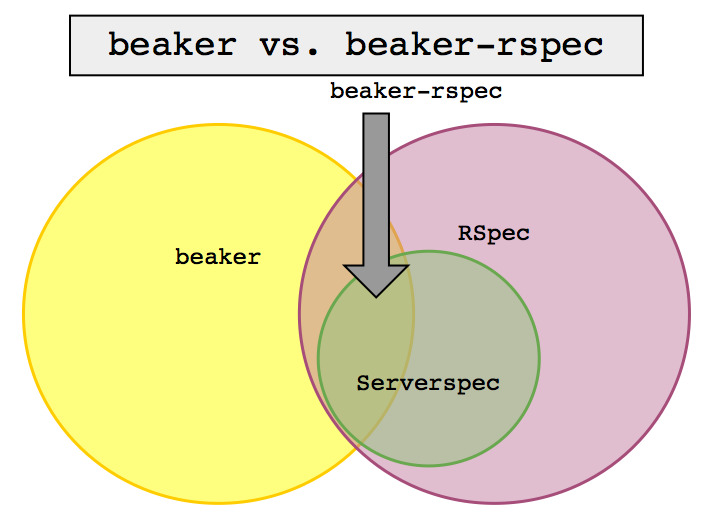beaker is an acceptance testing framework that is written in Ruby. beaker-rspec is a small shim that integrates the beaker DSL (domain specific language) with RSpec (a spec test format) and Serverspec (an extension to RSpec that provides many useful matchers).
- provisions and configures test hosts
- tests are just Ruby scripts
- tests pass if they execute all the way through without errors/exceptions
- tests can also use asserts to explicitly enforce a state
- tests written in Ruby with Beaker's domain specific language extensions
- tests can re-use functionality by using ruby constructs
- tests are driven by Beaker's own test runner
test_name "Be able to execute multi-line commands (#9996)"
confine :except, :platform => 'windows'
agents.each do |agent|
temp_file_name = agent.tmpfile('9996-multi-line-commands')
test_manifest = <<HERE
exec { "test exec":
command => "/bin/echo '#Test' > #{temp_file_name};
/bin/echo 'bob' >> #{temp_file_name};"
}
HERE
expected_results = <<HERE
#Test
bob
HERE
on(agent, "rm -f #{temp_file_name}")
apply_manifest_on agent, test_manifest
on(agent, "cat #{temp_file_name}") do
assert_equal(expected_results, stdout, "Unexpected result for host '#{agent}'")
end
on(agent, "rm -f #{temp_file_name}")
end
- builds on RSpec and Serverspec
- provisions and configures test hosts
- tests pass when all asserted expectations are fulfilled
- tests written in RSpec format, with Beaker data specific language extensions and Serverspec matchers
- tests can re-use functionality by using ruby or RSpec constructs
- tests are driven by RSpec's test runner
require 'spec_helper_acceptance'
describe 'apache class' do
case fact('osfamily')
when 'RedHat'
package_name = 'httpd'
service_name = 'httpd'
when 'Debian'
package_name = 'apache2'
service_name = 'apache2'
when 'FreeBSD'
package_name = 'apache24'
service_name = 'apache24'
when 'Gentoo'
package_name = 'www-servers/apache'
service_name = 'apache2'
end
context 'default parameters' do
it 'should work with no errors' do
pp = <<-EOS
class { 'apache': }
EOS
# Run it twice and test for idempotency
apply_manifest(pp, :catch_failures => true)
expect(apply_manifest(pp, :catch_failures => true).exit_code).to be_zero
end
describe package(package_name) do
it { is_expected.to be_installed }
end
describe service(service_name) do
it { is_expected.to be_enabled }
it { is_expected.to be_running }
end
describe port(80) do
it { should be_listening }
end
end
end
- Use the tool already in use in the project you are contributing to.
- beaker-rspec is used by many modules inside and outside of Puppet Labs for system-level and acceptance tests.
- beaker is used for all other testing within Puppet Labs (puppet, puppetDB, Puppet Enterprise, etc).
